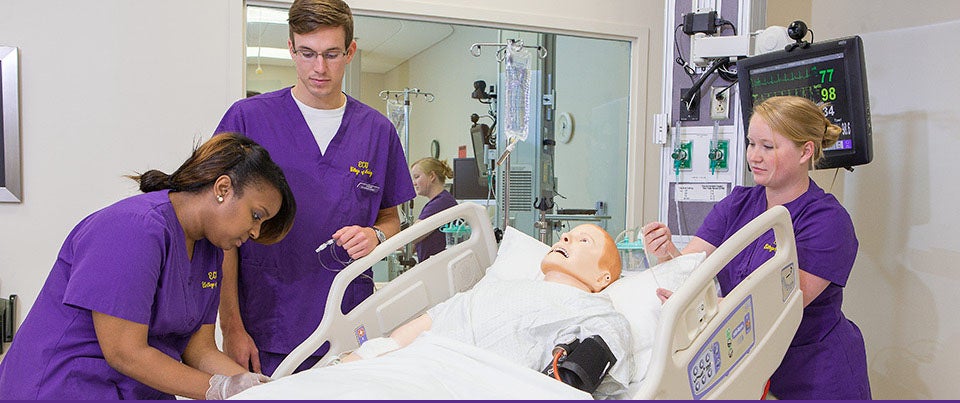PREPARING PRACTITIONERS
ECU producing most nurses in North Carolina
East Carolina University’s College of Nursing continues to produce the most registered nurses in North Carolina and its graduates pass the state nursing exam at a rate above the state average, according to data in a report prepared for the UNC Board of Governors.
The annual tracking report, received by the board at its June 20 meeting, said that 95 percent of the 273 graduates of ECU’s bachelor of science in nursing program who took the state exam in 2013 passed it.
The average state exam passing rate of all 12 UNC system campuses with nursing programs was 90 percent that year. The passing rate of all nursing programs in North Carolina, including those at private colleges and universities, was 85 percent in 2013, the report said.
Enrollment in all UNC nursing programs soared by 31 percent in the past five years, rising from 2,985 in 2009 to 4,212 in 2013, according to the report. Three UNC campuses launched nursing programs in recent years.
With more students in the pipeline, the UNC campuses with nursing programs are graduating 20 percent more RNs now than five years ago, the report said.
But despite the rise in nursing school enrollment, 3,500 nursing jobs remain unfilled across the state, the report said in citing March 2014 employment data.
Across the UNC system, enrollment in master’s degree programs grew from 1,471 to 1,637, or 11 percent, between 2009 and 2013. The number studying for doctoral degrees rose from 119 to 157, or 32 percent, in that time period, according to the report, which is based on data submitted by each campus.
At ECU, enrollment in master’s degree programs grew from 486 to 547 in that five-year period, while enrollment in doctoral programs grew from 31 to 49 in that period, the report said.
The Board of Governors has encouraged growth in enrollment in nursing programs since 2004 when, in conjunction with the N.C. Institute of Medicine, it created the UNC Committee on the Future of Nursing. The committee concluded that graduating more nurses was critical to improving access to health care.
More recently, the Board of Governors green-lighted new master’s and doctoral programs to increase the supply of nurses specially trained to take on more of the health care workload. An example is the doctor of nursing practice degree (DNP) created in 2013 at ECU and five other campuses.
Sylvia Brown, dean of ECU’s College of Nursing, said the DNP program will produce graduates critical to improving health care in the region. She said the program “will help to achieve our mission of improving the health of citizens through the preparation of expert practitioners who deliver primary care in rural areas of the state and assume leadership roles to advance health care delivery.”
The DNP prepares nurses for direct clinical practice and for executive roles in areas that support clinical practice, such as administration, organizational leadership, academics and health policy.
East Carolina’s DNP program coursework is totally online, and clinical practice sites include primary care clinics, hospitals, and public health care agencies. Students are required to attend skills sessions at the College of Nursing several times a year.
Twenty-one students were accepted to the first DNP class in fall 2013. More than half were from eastern North Carolina.
